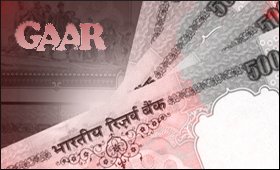|

|
India defers GAAR implementation by two years
|
|

|
|
| Top Stories |
 |
|
|
|
SME Times News Bureau | 15 Jan, 2013
In a move to boost investor confidence, India Monday deferred the implementation of the controversial General Anti-Avoidance Rules (GAAR) by two years to April 2016 and exempted non-resident Indians in foreign institutional investors (FIIs) from its purview.
"Having considered all the circumstances and relevant factors, government has decided that the provisions of Chapter 10A will come into force with effect from April 1, 2016 as against the current provision of April 1, 2014," Finance Minister P. Chidambaram told reporters in New Delhi.
The controversial GAAR norms introduced by the then finance minister Pranab Mukherjee is targeted at the foreign investors and companies routing money through tax havens like Mauritius.
The finance ministry had earlier said it would implement GAAR (General Anti-Avoidance Rules) from April, 2014.
Chidambaram said the government has accepted the major recommendations of the Parthasarthi Shome committee, appointed last year to look into the concerns of foreign investors, who are against the GAAR.
He said the tax proposal will not apply to foreign institutional investors (FIIs) run by non-resident Indians and will ensure that the same income is not taxed twice.
"GAAR will not apply to such FIIs that choose not to take any benefit under an agreement under section 90 or section 90A of the Income-tax Act, 1961. GAAR will also not apply to non-resident investors in FIIs," he said.
The finance minister clarified that investments made before August 2010 will be grandfathered.
Chidambaram said a monetary threshold of Rs.3 crore of tax benefit in the arrangement will be provided in order to attract the provisions of GAAR.
"Where a part of the arrangement is an impermissible avoidance arrangement, GAAR will be restricted to the tax consequence of that part which is impermissible and not to the whole arrangement," he said.
GAAR, which was proposed in 2012-13 budget to prevent tax evasion, evoked sharp reactions from foreign as well as domestic investors who feared that the law could be misused by taxmen to harass investors.
Planning Commission chairman Montek Singh Ahluwalia said the GAAR deferral as a step in the right direction as investors had started viewing the controversial tax norms as a negative.
GAAR became part of the law when the finance bill was passed by Parliament.
Following the Chidambaram's announcement, the Sensex shot up 155 points to 19,829 levels while the Nifty broke the 6,000 mark.
Here are the highlights of the amendments:
--If a tax structure is impermissible, GAAR will apply
-- No treaty override in new provision
-- GAAR will ensure same income is not taxed twice in the hands of the same taxpayer in the same year or in the next assessment year
-- GAAR will not apply to such FIIs that choose not to take any benefit under section 90 and 90A of the IT Act
-- If there is a tax avoidance arrangement, the existing provisions of the IT act say that GAAR provisions will prevail.
|
|
|
| |
|
|
|
|
|
|
|
Gaar Agreement
d.l.viswanath | Wed Jan 16 12:58:05 2013
Jt is really ironical how people evade taxes and put money in foreign accounts are being rewarded. whom are we appeasing. Do not control govt expenditure, allow rs to devalue from Rs 40 to Rs55 40% appreciation and allow them to bring money in thru tax havens.Is it not planned looting and who are benefiting. It is not encouraging NRI's most of whom are not living in tax havens and have paid taxes. It is benefiting thieves. Right time to plan money in flow for election. If political scoundrels are honest indirectly would have freezed thieved money by nationalizing like Mr Ramdev suggested.

|
|
|
|
|
|
|
| |
| Customs Exchange Rates |
| Currency |
Import |
Export |
US Dollar
|
66.20
|
64.50 |
UK Pound
|
87.50
|
84.65 |
Euro
|
78.25
|
75.65 |
| Japanese
Yen |
58.85 |
56.85 |
| As on 13 Aug, 2022 |
|
|
| Daily Poll |
 |
 |
| PM Modi's recent US visit to redefine India-US bilateral relations |
|
|
|
|
|
| Commented Stories |
 |
|
|
|
|
|
| |
|